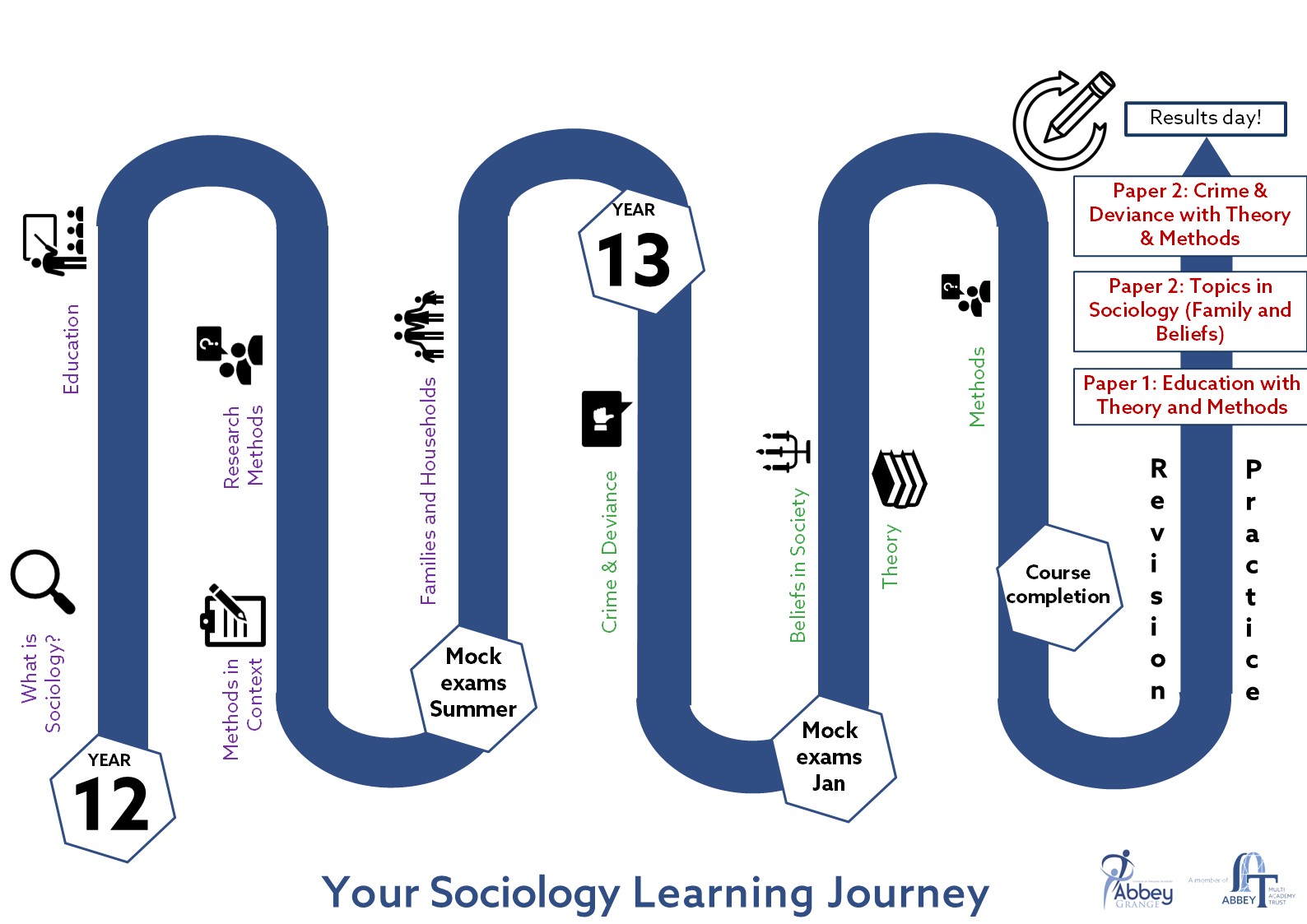
Sociology aims to foster a deep understanding of society, human behaviour, and the world around us. Students are encouraged to explore diverse perspectives and work towards a more equitable society. We encourage independent thought, collaboration, and the confidence to challenge social inequalities and injustice. Learners are empowered to become active citizens, lead with integrity and are capable of advocating for positive change.
Head of Department: Mrs Megan Winterburn

Students will explore key aspects of society, including family structures, education systems, crime and deviance, and social inequality. Students will read key texts for each topic, using these to develop critical thinking skills by examining sociological theories and real-world issues, enhancing their ability to analyse and evaluate evidence. Students will be encouraged to develop oracy skills through articulating their ideas clearly in discussions and engaging confidently with a range of sociological texts.
Studying sociology at GCSE gives students a unique opportunity to develop their ABBEY character.
High aspirations are cultivated by understanding how individuals and groups strive to improve their lives and the barriers they may face.
Benevolence grows as students learn about social justice and empathy for different communities. Students will be challenged to reflect on their beliefs and values and the role of culture and identity in society. Students will be encouraged to question assumptions, understand diverse perspectives, and engage with evidence-based arguments. By examining how society functions and changes, sociology fosters a deeper awareness of social responsibility, inequality, and global interdependence—equipping them with the tools to think independently and contribute thoughtfully to society. Finally, students will engage in discussions, express their viewpoints confidently, and become informed young people ready to contribute positively to their communities.
Students will sit two exams at the end of Year 11:
Paper 1: The Sociology of Families and Education
Time: 1 hour 45 minutes
100 marks
Paper 2: The Sociology of Crime and Deviance and Social Stratification
Time: 1 hour 45 minutes
100 marks
Whilst studying GCSE Sociology can help prepare you for A Level Sociology by building a strong foundation in key sociological concepts, theories, and research methods, it is not a requirement.
It also develops your skills in critical thinking, analysis, and writing, making it easier to engage with more complex topics and debates at A Level. It also opens pathways to careers in social work, education, policing, journalism, human rights, public services, and community work. With its focus on understanding people and society, sociology equips students with valuable skills in research, analysis, and communication that are highly valued in many professions.

Students will study how society is structured and how social forces shape individual and group behaviour. Core topics include Education, where they explore the role of education, the reproduction of inequality, and the impact of policies on achievement and social mobility. They will study Crime and Deviance, analysing causes, control, and societal reactions.
Students also learn about Theory and Methods, covering a range of sociological perspectives and research methods used to study society scientifically.
For Paper 2, students will cover the optional topics of Family and Households, which examines family diversity, roles, and changes, and Beliefs in Society, which looks at the role of religion, secularisation, and new religious movements.
Throughout the course, students develop skills in critical analysis, evaluation, and applying theory to evidence, preparing them to understand complex social issues deeply.
Sociology inspires critical thinking and broadens learners’ horizons by encouraging them to question assumptions, understand diverse perspectives, and engage with evidence-based arguments. Through studying social issues like inequality, discrimination, and social justice, students develop empathy, respect, and a deeper awareness of others’ experiences, fostering compassion and a desire to contribute positively to society. The study of Beliefs in Society helps students understand the role of religion and belief systems in shaping social structures, exploring their relationship with social change, secularisation, globalisation, and the connection between religion, science, and ideology. Overall, sociology equips learners with the tools to think independently, recognize social responsibility, and contribute thoughtfully to a fairer and more interconnected world.
Students will sit three exam papers at the end of Year 13:
Paper 1: Education with Theory and Methods
Paper 2: Topics in Sociology (Family and Beliefs)
Paper 3: Crime & Deviance with Theory and Methods
All three exams are 2 hours, worth 80 marks each
It provides a strong foundation for university courses in sociology, criminology, social policy, law, politics and psychology. It also opens pathways to careers in social work, education, policing, journalism, human rights, public services, and community work. With its focus on understanding people and society, sociology equips students with valuable skills in research, analysis, and communication that are highly valued in many professions.